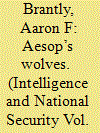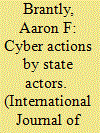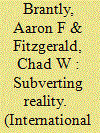| Srl | Item |
| 1 |
ID:
145587


|
|
|
|
|
| Summary/Abstract |
Appearances in cyberspace are deceptive and problematic. Deception in the cyber domain poses an immensely difficult challenge for states to differentiate between espionage activities in cyberspace and cyber attacks. The inability to distinguish between cyber activities places US cyber infrastructure in a perilous position and increases the possibility of a disproportionate or inadequate response to cyber incidents. This paper uses case analysis to examine the characteristics associated with the tools and decisions related to cyber espionage and cyber attacks to develop a framework for distinction leveraging epidemiological models for combating disease.
|
|
|
|
|
|
|
|
|
|
|
|
|
|
|
|
| 2 |
ID:
132419


|
|
|
|
|
| Publication |
2014.
|
| Summary/Abstract |
Covert action is as old as political man. The subversive manipulation of others is nothing new. It has been written about since Sun Tzu and Kautilya. People and nations have always sought the use of shadowy means to influence situations and events. Covert action is and has been a staple of the state system. A dark and nefarious tool often banished to philosophical and intellectual exile, covert action is in truth an oft-used method of achieving utility that is frequently overlooked by academics. Modern scholars contend that, for utility to be achieved, activities such as war and diplomacy must be conducted transparently. Examined here is the construction of utility for a subset of covert action: cyber attacks.
|
|
|
|
|
|
|
|
|
|
|
|
|
|
|
|
| 3 |
ID:
151768


|
|
|
|
|
| Summary/Abstract |
The digital era has placed most of humanity’s knowledge within a few clicks of a computer mouse or the touches of a smart phone screen. Yet in an age where knowledge is so readily available it is also seemingly elusive. Reality hides behind oceans of information streamed from innumerable sources competing for a single moment of attention. But disinformation dangerously poisons that abundance of knowledge and begins a process of ideational inception, in which even the idea of reality is itself subverted.
|
|
|
|
|
|
|
|
|
|
|
|
|
|
|
|
| 4 |
ID:
151782


|
|
|
|
|
| Summary/Abstract |
The digital era has placed most of humanity’s knowledge within a few clicks of a computer mouse or the touches of a smart phone screen. Yet in an age where knowledge is so readily available it is also seemingly elusive. Reality hides behind oceans of information streamed from innumerable sources competing for a single moment of attention. But disinformation dangerously poisons that abundance of knowledge and begins a process of ideational inception, in which even the idea of reality is itself subverted.
|
|
|
|
|
|
|
|
|
|
|
|
|
|
|
|
| 5 |
ID:
159929


|
|
|
|
|
| Summary/Abstract |
By 2020, the number of IOT devices will surpass 20.1 billion, and these devices combined with user interactions will generate enormous data streams that will challenge analytic capabilities constrained by human faculties, legal, regulatory, and policy frameworks designed for bygone eras. This work examines the impact of machine learning and artificial intelligence on legal, regulatory, policy and technical aspects of intelligence to provide insights into state, sub-state, and human behavior. This work develops an adaptive theory of Cyber Intelligence that will play an increasingly central role within the Intelligence Community in the decade(s) to come.
|
|
|
|
|
|
|
|
|
|
|
|
|
|
|
|